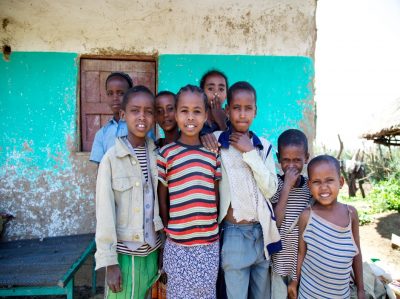PMI supports a range of activities to ensure high-quality antimalarials are available in PMI focus countries.

PMI supports a wide range of activities to ensure that children receive antimalarials of high quality. Source: Brant Stewart,RTI
Malaria is a major public health problem in Ethiopia. Three quarters of the land mass is prone to malaria and 57 million inhabitants are at risk of infection. Over the past few years, significant progress has been made to scale up malaria control interventions including universal access to prompt diagnosis and treatment. In 2012, access to diagnosis and treatment expanded to reach 83% of all suspected malaria cases. However, the gains in access could be compromised due to the proliferation of unregistered or illegal drugs that are obtained on the black market, which means ineffective drugs may be used to treat cases of malaria, potentially putting people’s lives at risk.
According to a 2012 studyi conducted in 21 sub-Saharan countries, 35% of antimalarial drugs failed chemical analysis, 36% failed packaging analysis, and 20% were classified as falsified. With financial support from PMI, the United States Pharmacopeia (USP) Promoting the Quality of Medicines (PQM) program has been working to strengthen Ethiopia’s Food, Medicine, and Healthcare Administration and Control Authority (FMHACA) to monitor the quality of antimalarial drugs. In 2012, FMHACA conducted surveillance of the quality of antimalarial drugs on the market. The findings revealed that the quality of drugs in circulation was reasonably high; however, 34% of the drugs were not registered with the regulatory authority and hotspots for illegal drug smuggling were identified. This information helped FMHACA to take corrective administrative actions on pharmacies and drug outlets that sell illegal drugs.
A workshop brought together representatives from the Ministry of Health, the Ministry of Customs and Revenue, FMHACA, regional regulatory offices, law enforcement, and community members to discuss the results of these antimalarial drug surveillance activities. At the workshop, participants agreed to: (1) continue monitoring antimalarials on the market, (2) use various media to raise community awareness of the dangers of counterfeit drugs, and (3) increase collaboration with neighboring countries, such as Kenya. The workshop was broadcast on national and regional radio and television stations to raise public awareness about illegal malaria drugs and smuggling. Among other initial post-workshop activities, mobile vans disseminated messages to the public during three days in Yabello, an area along the Ethiopian-Kenyan border which is prone to illegal drug smuggling.
PMI’s support is appreciated by Mr. Yehulu Denekew, the Director General of Ethiopia’s FMHACA, who stated: “I would like to thank PMI and the USP-PQM program for the support provided to strengthen FMHACA to conduct the post-marketing surveillance and the workshop to create awareness of the community to prevent themselves from the harm of illegal medicines.”
PMI supports a range of activities to ensure high-quality antimalarials are available in PMI focus countries. This includes working to prevent the introduction of counterfeit drugs into supply chains, supporting national regulatory authorities to improve drug quality through activities such as post-marketing surveillance, technical assistance on quality assurance testing through technology such as mini-labs, and strengthening the capacity for regulation in both the public and private sectors. PMI also employs rigorous measures to ensure the integrity of the medicines that are supplied through the Initiative and all antimalarials that are directly procured are subjected to stringent quality assurance measures.
iGaurvika ML Nayyar, Joel G Breman, Paul N Newton, James Herrington. June 2012. Poor-quality antimalarial drugs in southeast Asia and sub-Saharan Africa. The Lancet Infectious Diseases, Volume 12, Issue 6, Pages 488-496.
